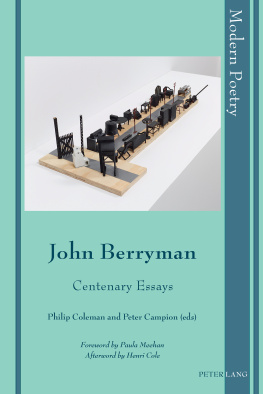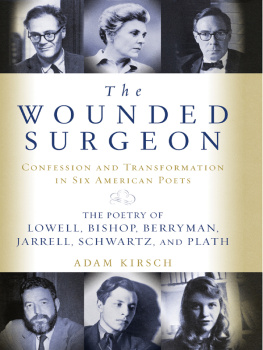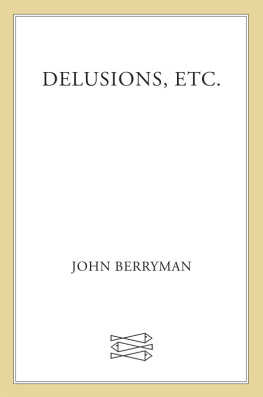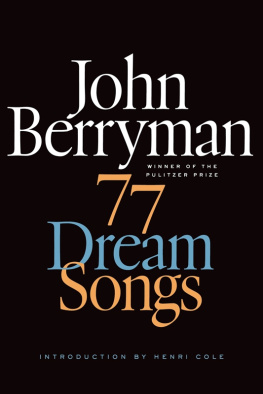Berryman John - Poets in their youth: a memoir
Here you can read online Berryman John - Poets in their youth: a memoir full text of the book (entire story) in english for free. Download pdf and epub, get meaning, cover and reviews about this ebook. City: New York, year: 2014, publisher: Farrar, Straus and Giroux, genre: Detective and thriller. Description of the work, (preface) as well as reviews are available. Best literature library LitArk.com created for fans of good reading and offers a wide selection of genres:
Romance novel
Science fiction
Adventure
Detective
Science
History
Home and family
Prose
Art
Politics
Computer
Non-fiction
Religion
Business
Children
Humor
Choose a favorite category and find really read worthwhile books. Enjoy immersion in the world of imagination, feel the emotions of the characters or learn something new for yourself, make an fascinating discovery.

- Book:Poets in their youth: a memoir
- Author:
- Publisher:Farrar, Straus and Giroux
- Genre:
- Year:2014
- City:New York
- Rating:5 / 5
- Favourites:Add to favourites
- Your mark:
- 100
- 1
- 2
- 3
- 4
- 5
Poets in their youth: a memoir: summary, description and annotation
We offer to read an annotation, description, summary or preface (depends on what the author of the book "Poets in their youth: a memoir" wrote himself). If you haven't found the necessary information about the book — write in the comments, we will try to find it.
Poets in their youth: a memoir — read online for free the complete book (whole text) full work
Below is the text of the book, divided by pages. System saving the place of the last page read, allows you to conveniently read the book "Poets in their youth: a memoir" online for free, without having to search again every time where you left off. Put a bookmark, and you can go to the page where you finished reading at any time.
Font size:
Interval:
Bookmark:
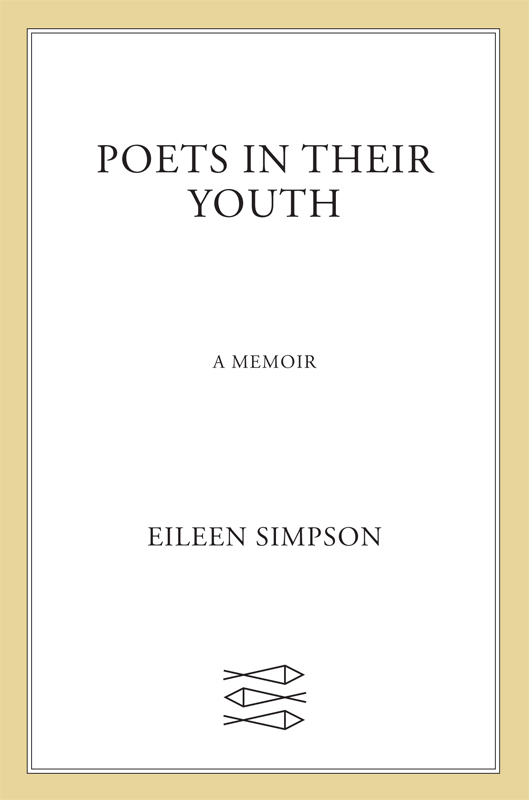

The author and publisher have provided this e-book to you for your personal use only. You may not make this e-book publicly available in any way. Copyright infringement is against the law. If you believe the copy of this e-book you are reading infringes on the authors copyright, please notify the publisher at: us.macmillanusa.com/piracy.
CONTENTS
In loving memory of
ROBERT SIMPSON
We poets in our youth begin in gladness;
But thereof comes in the end despondency and madness.
W ORDSWORTH
PREFACE TO THE 1990 EDITION
When Poets in Their Youth was first published in 1982, more than one reviewer pointed out that I had said little about why these poetsDelmore Schwartz, Randall Jarrell, Robert Lowell, John Berryman, Theodore Roethke and Dylan Thomashad lived such turbulent lives and died sudden or violent deaths. It was not that I hadnt thought about this, but it seemed to me that to deal with the question properly would require consideration in a depth and at a length outside the scope of my memoir. Such a study should be written by a literary critic or cultural historian who would probably have to take account also of the painters of the same generation, whose lives were no more serene, whose deaths no more gentle.
Among themselves the poets talked a good deal about the kind of social and intellectual climate that is nourishing, or damaging, to talent and genius. They felt they were living in a period inhospitable to poetry, and blamed society for their lack of an audience. Both Schwartz and Jarrell wrote articles about the isolation of the modern poet, an isolation they felt had increased even more since the time of their masters in the previous generation. (Who among them could look forward to having a patroness like Lady Gregory?)
In Schwartzs rewriting of Wordsworths line We poets in our youth begin in gladness, it became We poets in our youth begin in sadness. Early in their careers they suffered from emotional turmoil, and had premonitions of the despondency and madness to come.
Since their deaths, their extremist behavior (as Alvarez called it) has been seen by some to be the price they paid for the Faustian bargain they struck when they chose the perfection of art over life. Others have suggested that they suffered from what Werner Berthoff called the towering shadow of their extraordinary predecessorsYeats, Pound, Eliot, Stevens, Frost, Williamswho refused to fade away and give them place.
During a recent symposium on the self-destructiveness of American writers, my spirits rose when Galway Kinnell turned the discussion to the healing power of art. He had met a woman at a London party who, on learning that he was a poet, asked if he knew the poems of John Berryman. When he said that he did, the woman took from her wallet a well-worn piece of paper and gave him this to read:
Age, and the deaths, and the ghosts.
Her having gone away
in spirit from me. Hosts
of regrets come & find me empty.
I dont feel this will change.
I dont want any thing
or person, familiar or strange.
I dont think I will sing
any more just now;
or ever. I must start
to sit with a blind brow
above my empty heart.
When Kinnell asked why she carried around such a desolate poem, she said that when she was on the verge of suicide she had chanced upon it. The realization that another human being had felt exactly as she was feeling had saved her life. Ever since, she had carried He Resignsa poem from Delusions, etc. with her as a talisman against suicide.
It pleased me greatly to be told by those who wrote me about my memoir that the book had sent them back to the poetry. Once again they were reading Lowell, Jarrell, Schwartz and the others with pleasure and excitement. I hope this new edition will also send readers to the poems themselves.
January 26, 1990
E. S.
I
JOHN AND DELMORE
The links between the poets in the generation born around World War I were beginning to be forged by the time I met them in the early forties. On a Friday afternoon in February 1942, I was in Pennsylvania Station waiting for a train from Boston. John Berryman, with whom I had fallen in love the previous summer, was arriving with Delmore Schwartz for the weekend. During the nine months I had known John he had talked so much about his fellow poet and colleague at Harvard that I felt I knew him, too. With dazzling precocity Delmore had made his name following the publication in 1938 of In Dreams Begin Responsibilities, a collection of poems and stories. The critics who mattered most to both of themAllen Tate, R. P. Blackmur, John Crowe Ransom, Mark Van Dorenhad concurred in the opinion expressed by Tate that Delmores poetic style was the first real innovation weve had since Eliot and Pound. The title story, which had previously been published in Partisan Review, had been hailed as a masterpiece. At the age of twenty-six, Delmore was famous in the literary world.
Johns career, by contrast, had barely begun. His first publication in book form had been in Five Young American Poets (1940), to which he had contributed twenty poems and, very reluctantly, a photograph. The man in the photograph looked absurdly unlike the one who had been brought to my New Years Day party in 1941, the man who had kissed me under the mistletoe, saying with an impish grin, One should respect custom, dont you agree? Long and hard study of the face made me suspect that if I hoped to understand a character more complex than any I had previously known, I would have to make a composite of the man with the irresistible grin and the proud and introverted poet in the photograph.

John Berryman in 1941the irresistible grin
The clock at the information booth in the stations great concourse seemed to have stopped. I tried to temper my eagerness and impatience by mingling with the throng of students arriving from Eastern colleges. Anticipation and excitement over the long weekend filled the wintry dusk that filtered down through the clerestory windows. From time to time I took out a pocket mirror and critically examined my new hat. Small, made of black velvet, it perched over one eye, and had a chin veil sprinkled with little dots. It was the height of fashion. Studying it critically, I decided that, yes, it had been worth a week of lean lunches. But would John find it becoming? If I understood his feelings correctly, there was no limit to how attractive I could be for him, although I must somehow arrange it so that I would not be attractive to other men. The veil was proving troublesome. My eyelashes kept catching in the little dots.
* * *
From January to June of the previous year I had heard from John only once, at the time he sent me a copy of his book. It wasnt until he came to New York at the end of the academic year on a brief visit to his mother that we met again. From then on we were inseparable until he returned to Harvard in the fall. After it became clear that he was going to stay on in the city that summer, he rented a low dark long damp room below ground on Lexington Avenue at Thirty-sixth Street, where he wrote, listened to music and, as he said afterward, plotted how to seduce me. At five oclock, when I left the office where I was working on lower Broadway, we met in the Jumble Shop on Eighth Street for a drink. Or went to rundown, airless, steaming movie houses on the Lower East Side to see films like Potemkin and Alexander Nevsky. Or to the Apollo on Forty-second Street for any picture with Louis Jouvet or Jean-Louis Barrault.
Font size:
Interval:
Bookmark:
Similar books «Poets in their youth: a memoir»
Look at similar books to Poets in their youth: a memoir. We have selected literature similar in name and meaning in the hope of providing readers with more options to find new, interesting, not yet read works.
Discussion, reviews of the book Poets in their youth: a memoir and just readers' own opinions. Leave your comments, write what you think about the work, its meaning or the main characters. Specify what exactly you liked and what you didn't like, and why you think so.

